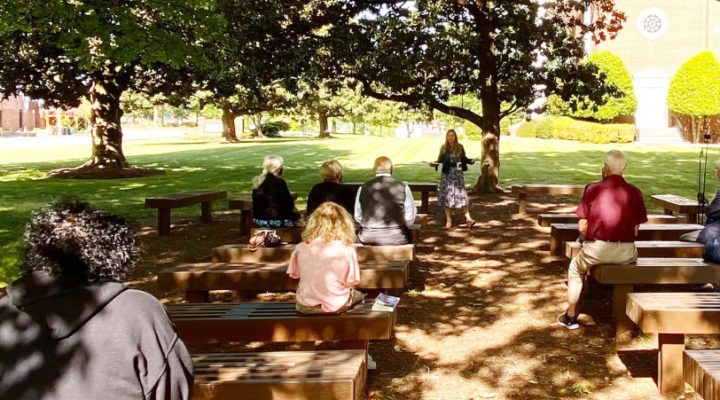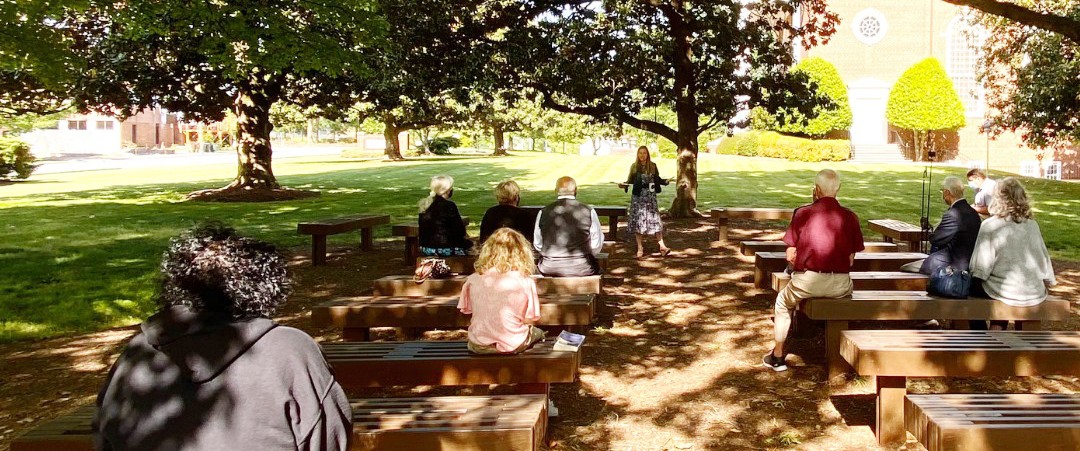The COVID-19 pandemic posed challenges to churches, but it also helped them sift through outdated programming and policies to reinvent ministry going forward, according to panelists of “Expanding Engagement in the Local Church,” an Aug. 25 workshop of the Cooperative Baptist Fellowship’s ongoing virtual General Assembly.
Times of physical separation imposed by the coronavirus outbreak inspired not only technological improvements but also small face-to-face encounters that will continue beyond the pandemic, said panelist Courtney Willis, associate pastor for faith formation and congregational life at First Baptist Church in Greensboro, N.C.
“We will move forward with a little more intimacy than we had in the past,” Willis said during the workshop moderated by Chris Aho, director of CBF’s Thriving Congregations project.
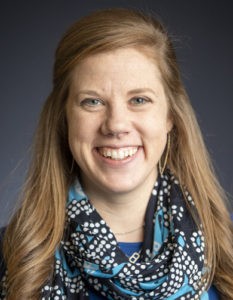
Brittany Stillwell
Brittany Stillwell, minister to students and families at Second Baptist Church in Little Rock, Ark., and Jeff Roberts, senior pastor at Trinity Baptist Church in Raleigh, N.C., rounded out the panel that described ministry before the 2020 coronavirus outbreak, the financial challenges it imposed, the values that guided churches through the implementation of online programming and lessons learned from the entire experience.
“A lot of the things we had to do over the last 18 months have brought out the best in who we are and we will continue to do that going forward,” Willis said. Those innovations included inviting individual families to visit the sanctuary at First Baptist during Advent, when in-person worship was still suspended, to receive communion and blessings.
Another was holding two worship elements — the passing of the peace and the doxology — outdoors. “This is a really beautiful, holistic moment of faith and fellowship and there is no way we are going to get rid of that,” Willis said.
Picturing the future can be challenging, but the pandemic has produced a freedom to try new things that is liberating for staff and congregation alike, Stillwell added.
This spirit of experimentation has led to patio lunches with existing and prospective members and a doubling down on the congregation’s longstanding commitment to social and racial justice actions, she explained. “There is a renewed energy for what church can be and how we can best love our people and our city.”
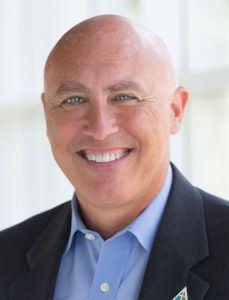
Jeff Roberts
Roberts said the pandemic gifted him with the opportunity to meet with more of his 2,500-members in small-group situations than ever before.
The realities of social distancing also deepened the connection between members, he said. “The pandemic has helped reminds us of those important personal moments.”
He believes the pandemic also accelerated changes many congregations already were considering before the outbreak.
At Trinity Baptist, the congregation and its staff historically shared a common schedule, a common vision and common experience — a social construct that no longer matched the realities of modern life, Roberts said. “Right before COVID I felt like we were in a great spot as we entered 2020 to explore a new direction.”
The shutdown in March 2020 radically accelerated the process as Roberts, his staff and congregation had to condense ministry into a week-to-week, if not day-to-day, operation.
In addition to technological improvements necessitated by the pandemic, Roberts said he had to let go of much of the daily decision making and empower staff and laity to take more responsibilities: “We had to learn to let people make choices. That’s been empowering for us as a church.”
“We had to learn to let people make choices. That’s been empowering for us as a church.”
First Baptist in Greensboro also was brainstorming a new future in response to changing identity, attendance and social patterns as 2020 approached, Willis said. She added that occupancy levels of classrooms and other spaces also were being examined.
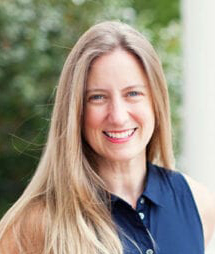
Courtney Willis
“We were sensing things were shifting,” Willis said. “We were starting to pay attention to these things.”
But the lockdown inspired a radical embrace in the way time and space are viewed and used at the church. An outdoor chapel was created for worship and small-group gatherings, mid-week lunches were held in place of Wednesday night gatherings, and staff have experimented in how they plan and judge events — including being OK if attendance is low.
“The value is not in the breadth, it’s in the depth,” she said.
When the pandemic came to Little Rock, Second Baptist had just scheduled an Enneagram conference to respond to changes already being observed, Stillwell said. These included less frequent attendance and more members seeking spiritual formation outside the church, Stillwell explained.
The church responded to the outbreak with an effort to help senior adults connect virtually and by scheduling patio lunches and drive-by visits to boost fellowship.
Second Baptist also addressed its calling to social justice by issuing a statement about systemic racism, holding voter registration drives and training parents in how to talk to children about racism, Stillwell said.
None of the panelists reported financial hardships as a result of the pandemic because technology and other new needs were paid for with funds from accounts not being used in the lockdown.
“Our kitchen needs and curriculum needs aren’t what they were,” Willis said. She added that it makes budgeting for following years easier because doing so is unnecessary. “Right now, we can’t plan for a year out as effectively as before, so we are trying to take it in chunks.”
Related articles:
Pastors ponder pandemic preaching problems — and how they’ve survived

